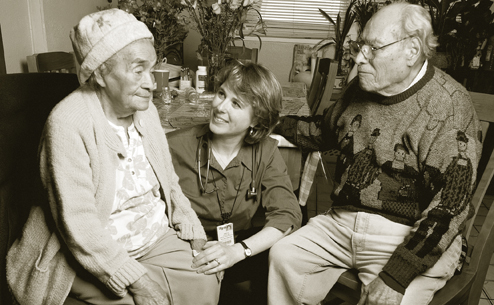Centers of Excellence Focus on Research and Training
The Hartford Foundation Centers of Excellence grants primarily fund advanced fellows and junior faculty. Support for fellows allows those interested in pursuing an academic career to continue their fellowship training beyond the first year, thus giving them the resources and assistance they need to make the transition from fellow to faculty member. Support for junior faculty, early in their faculty appointments, can be instrumental as they establish their programs of research and obtain career development awards. Centers of Excellence funding is also used for the development of clinician educators and to foster academic clinician leaders.

Rebecca Conant, MD with Carmen Navarro, age 106 and Jose Navarro, age 101. Dr. Conant is an Assistant Clinical Professor in the Division of Geriatrics at UCSF, where she leads the UCSF Housecalls Program. The program provides care to seniors and-through home visits-helps medical students to better understand the lives of their older patients.
Most government-sponsored research development awards provide support for junior faculty who have had the time to document evidence of their scholarly productivity and potential, but in under-funded medical disciplines this policy can create a gap. Hartford Centers of Excellence provide fellows and junior faculty with support for protected time to accomplish the work necessary to develop a track record that illustrates their potential to become independent investigators able to advance science. At a time when financial pressures are often put on faculty to generate their salary by providing patient care, Center of Excellence funding helps bridge that gap. The long-term goal of developing new faculty to teach geriatrics does not have to be sacrificed to new professors’ immediate needs to draw a salary.
In general, scholars supported by the Hartford Centers of Excellence pursue one of the following career objectives: basic science researcher, clinical researcher, health services or outcomes researcher, or clinician educator. Centers of Excellence funds also go toward support for fellows and junior faculty from specialties outside geriatrics who are engaged in aging-related research. On the following pages, faculty who have benefitted from their local Center of Excellence discuss the varied roles funding played in their successes to date.
